西南交通大学博士研究生入学统一考试英语考试大纲
- 格式:docx
- 大小:15.02 KB
- 文档页数:2
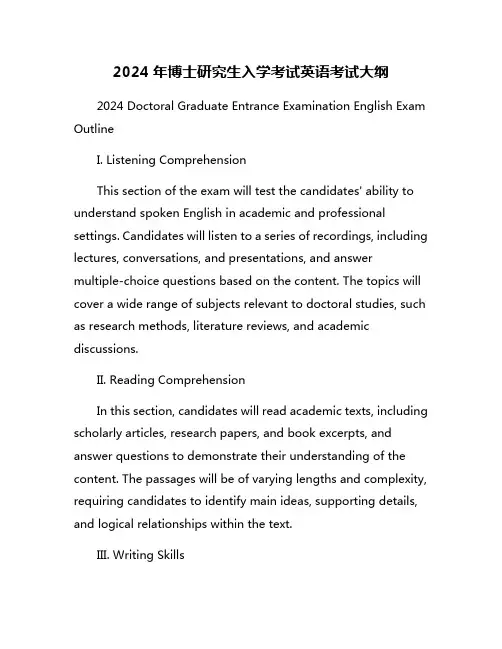
2024年博士研究生入学考试英语考试大纲2024 Doctoral Graduate Entrance Examination English Exam OutlineI. Listening ComprehensionThis section of the exam will test the candidates' ability to understand spoken English in academic and professional settings. Candidates will listen to a series of recordings, including lectures, conversations, and presentations, and answer multiple-choice questions based on the content. The topics will cover a wide range of subjects relevant to doctoral studies, such as research methods, literature reviews, and academic discussions.II. Reading ComprehensionIn this section, candidates will read academic texts, including scholarly articles, research papers, and book excerpts, and answer questions to demonstrate their understanding of the content. The passages will be of varying lengths and complexity, requiring candidates to identify main ideas, supporting details, and logical relationships within the text.III. Writing SkillsCandidates will be required to demonstrate their ability to write coherent and well-structured essays on a variety of topics related to their field of study. This section will test candidates' proficiency in academic writing, including the ability to formulate clear arguments, provide evidence to support their claims, and organize their ideas in a logical manner. Candidates may be asked to analyze a case study, evaluate a research question, or propose a research methodology.IV. Vocabulary and GrammarThis section will assess candidates' knowledge of vocabulary and grammar in academic English. Candidates will be tested on their ability to use complex vocabulary and grammar structures accurately and appropriately in written and spoken English. This section may include exercises on word meaning, word usage, sentence structure, and grammatical rules.V. Speaking SkillsCandidates will be required to engage in conversations and discussions on academic topics with examiners. This section will test candidates' ability to express ideas clearly and coherently, respond to questions, and engage in academic discourse. Candidates will be evaluated on their fluency, pronunciation, vocabulary usage, and grammar accuracy.Overall, the 2024 Doctoral Graduate Entrance Examination English Exam is designed to assess candidates' readiness for doctoral studies by evaluating their listening, reading, writing, speaking, vocabulary, and grammar skills in academic English. Candidates are encouraged to prepare thoroughly for the exam by practicing listening and reading comprehension, academic writing, vocabulary building, and speaking skills in English. Good luck to all the candidates!。
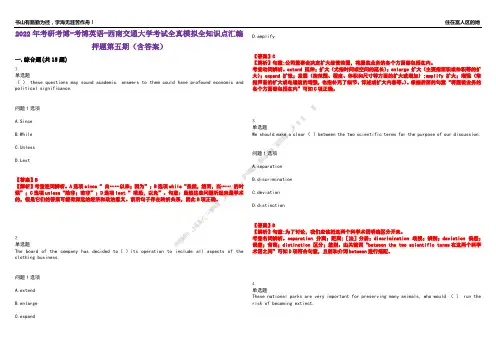
2022年考研考博-考博英语-西南交通大学考试全真模拟全知识点汇编押题第五期(含答案)一.综合题(共15题)1.单选题() these questions may sound academic, answers to them could have profound economic and political significance.问题1选项A.SinceB.WhileC.UnlessD.Lest【答案】B【解析】考查连词辨析。
A选项since“ 自……以来;因为”;B选项while“虽然,然而,当…… 的时候”;C选项unless“除非;若非”;D选项lest“ 唯恐,以免”。
句意:虽然这些问题听起来是学术的,但是它们的答案可能有深远的经济和政治意义。
前后句子存在转折关系,因此B项正确。
2.单选题The board of the company has decided to()its operation to include all aspects of the clothing business.问题1选项A.extendB.enlargeC.expandD.amplify【答案】C【解析】句意:公司董事会决定扩大经营范围,将服装业务的各个方面都包括在内。
考查动词辨析。
extend 延伸;扩大(尤指时间或空间的延长);enlarge 扩大(主要指面积或体积等的扩大);expand 扩张;发展(指范围、程度、体积和尺寸等方面的扩大或增加);amplify 扩大;增强(常指声音的扩大或电磁波的增强,也指补充了细节、详述或扩大内容等。
)。
根据后面的句意“将服装业务的各个方面都包括在内”可知C项正确。
3.单选题We should make a clear()between the two scientific terms for the purpose of our discussion. 问题1选项A.separationB.discriminationC.deviationD.distinction【答案】D【解析】句意:为了讨论,我们应该把这两个科学术语明确区分开来。
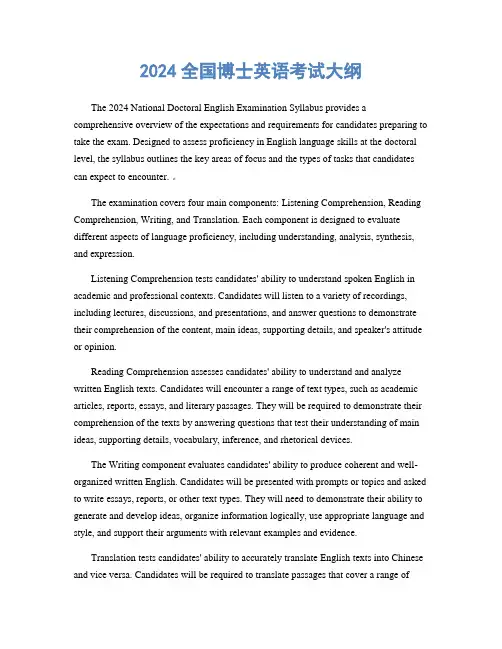
2024全国博士英语考试大纲The 2024 National Doctoral English Examination Syllabus provides a comprehensive overview of the expectations and requirements for candidates preparing to take the exam. Designed to assess proficiency in English language skills at the doctoral level, the syllabus outlines the key areas of focus and the types of tasks that candidates can expect to encounter. 。
The examination covers four main components: Listening Comprehension, Reading Comprehension, Writing, and Translation. Each component is designed to evaluate different aspects of language proficiency, including understanding, analysis, synthesis, and expression.Listening Comprehension tests candidates' ability to understand spoken English in academic and professional contexts. Candidates will listen to a variety of recordings, including lectures, discussions, and presentations, and answer questions to demonstrate their comprehension of the content, main ideas, supporting details, and speaker's attitude or opinion.Reading Comprehension assesses candidates' ability to understand and analyze written English texts. Candidates will encounter a range of text types, such as academic articles, reports, essays, and literary passages. They will be required to demonstrate their comprehension of the texts by answering questions that test their understanding of main ideas, supporting details, vocabulary, inference, and rhetorical devices.The Writing component evaluates candidates' ability to produce coherent and well-organized written English. Candidates will be presented with prompts or topics and asked to write essays, reports, or other text types. They will need to demonstrate their ability to generate and develop ideas, organize information logically, use appropriate language and style, and support their arguments with relevant examples and evidence.Translation tests candidates' ability to accurately translate English texts into Chinese and vice versa. Candidates will be required to translate passages that cover a range oftopics and genres, including academic, scientific, technical, and literary texts. They will need to demonstrate their understanding of both languages' grammar, vocabulary, and idiomatic expressions, as well as their ability to convey the original meaning and tone of the text.Overall, the 2024 National Doctoral English Examination Syllabus provides a clear outline of the expectations and requirements for candidates preparing to take the exam. By familiarizing themselves with the content and format of the exam, candidates can better prepare and improve their chances of success.。
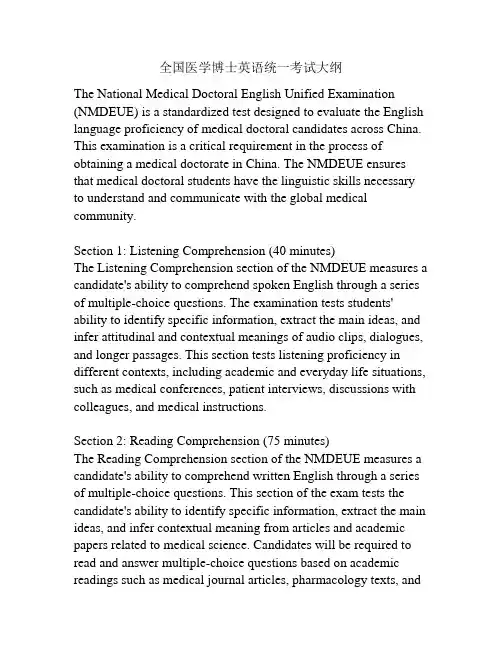
全国医学博士英语统一考试大纲The National Medical Doctoral English Unified Examination (NMDEUE) is a standardized test designed to evaluate the English language proficiency of medical doctoral candidates across China. This examination is a critical requirement in the process of obtaining a medical doctorate in China. The NMDEUE ensures that medical doctoral students have the linguistic skills necessary to understand and communicate with the global medical community.Section 1: Listening Comprehension (40 minutes)The Listening Comprehension section of the NMDEUE measures a candidate's ability to comprehend spoken English through a series of multiple-choice questions. The examination tests students' ability to identify specific information, extract the main ideas, and infer attitudinal and contextual meanings of audio clips, dialogues, and longer passages. This section tests listening proficiency in different contexts, including academic and everyday life situations, such as medical conferences, patient interviews, discussions with colleagues, and medical instructions.Section 2: Reading Comprehension (75 minutes)The Reading Comprehension section of the NMDEUE measures a candidate's ability to comprehend written English through a series of multiple-choice questions. This section of the exam tests the candidate's ability to identify specific information, extract the main ideas, and infer contextual meaning from articles and academic papers related to medical science. Candidates will be required to read and answer multiple-choice questions based on academic readings such as medical journal articles, pharmacology texts, andpatient histories.Section 3: Writing Skills (85 minutes)The Writing Skills section of the NMDEUE measures a candidate's ability to convey complex medical information in English. Candidates will be required to write a summary, a critique, and a response to a scientific article. This section of the exam tests students' ability to express medical language in a clear, concise, and accurate manner. This section evaluates the student's ability to use appropriate medical terminology, grammar, and syntax in written English. The writing tasks will be based on medical topics drawn from the core syllabus of the medical doctorate program. Section 4: Speaking Skills (20 minutes)The Speaking Skills section of the NMDEUE measures a candidate's ability to articulate complex medical concepts in spoken English. Candidates will be required to answer a series of open-ended questions related to medical science. This section of the exam will test the student's ability to use appropriate medical terminology, grammar, and syntax in spoken English while demonstrating appropriate pronunciation, intonation, and stress. The Speaking Skills section evaluates the student's ability to communicate effectively in academic and professional medical settings.ConclusionThe NMDEUE is an essential component of the medical doctoral program in China. It is a standardized test designed to evaluate a candidate's proficiency in English across the domains of listening comprehension, reading comprehension, writing skills, andspeaking skills. The examination ensures that medical doctoral students in China have the linguistic skills necessary to communicate effectively on a global level. By meeting the criteria set by the NMDEUE, medical doctoral candidates are equipped with the necessary tools to pursue a successful career in the highly competitive medical industry.The NMDEUE is a demanding examination that requires thorough preparation and a high degree of language proficiency. Candidates who intend to take this exam must have a strong foundation in English grammar, vocabulary, syntax, and pronunciation. They must also be familiar with the medical terminology that is used in English-speaking countries.The Listening Comprehension section of the NMDEUE requires candidates to have good listening skills and the ability to identify specific information in a variety of spoken contexts. To prepare for this section, candidates are advised to listen to English-language podcasts, watch English movies or TV shows, and practice taking notes while listening to lectures. It is also helpful to familiarize oneself with various accents and dialects used in English-speaking countries.The Reading Comprehension section of the NMDEUE demands extensive reading comprehension skills and the ability to extract main ideas and critical details from academic papers and articles. Candidates should practice reading medical journals and textbooks in English and learn to annotate and summarize what they have read. They should also study different types of texts, such as scientific articles, case studies, and patient histories.The Writing Skills section of the NMDEUE is a comprehensiveevaluation of a candidate's writing skills. Candidates must be able to write clear and concise sentences, use appropriate medical terminology and syntax, and structure their writing effectively. In preparation, candidates should study different types of writing, including summaries, critiques, and responses to scientific articles. They should also practice organizing their writing and using cohesive and coherent language.The Speaking Skills section of the NMDEUE requires candidates to express themselves clearly, confidently, and effectively in spoken English. To prepare, candidates should practice speaking in English in various contexts, such as medical conferences, patient interviews, and interactions with colleagues. They should also learn how to use appropriate intonation, stress, and pronunciation when communicating in English.In addition to language proficiency, the NMDEUE evaluates a candidate's ability to apply medical knowledge in English. Therefore, candidates must have a deep understanding of medical terminology and concepts. They must be familiar with the core syllabus of the medical doctoral program and have a good grasp of medical sciences, including anatomy, pharmacology, and pathology. They should also be familiar with current trends in medical research and be able to discuss key issues in medical ethics and practice.ConclusionThe NMDEUE is a rigorous examination that evaluates a candidate's language proficiency and knowledge of medicalsciences. It is an essential requirement in the medical doctoral program in China, and passing this examination is crucial for obtaining a medical doctoral degree and pursuing a successful career in the global medical industry.To achieve success in the NMDEUE, candidates must prepare thoroughly and systematically. They should study and practice all four sections of the exam, including listening comprehension, reading comprehension, writing skills, and speaking skills. They should also focus on improving their language proficiency by reading and listening to English-language materials, practicing writing and speaking in English, and building their medical knowledge through systematic study and research.Overall, the NMDEUE is a challenging but rewarding examination that tests a candidate's ability to communicate effectively in English and apply medical knowledge in a global context. By passing the NMDEUE, medical doctoral candidates in China can demonstrate their language proficiency and readiness to excel in the dynamic and competitive field of medicine.。
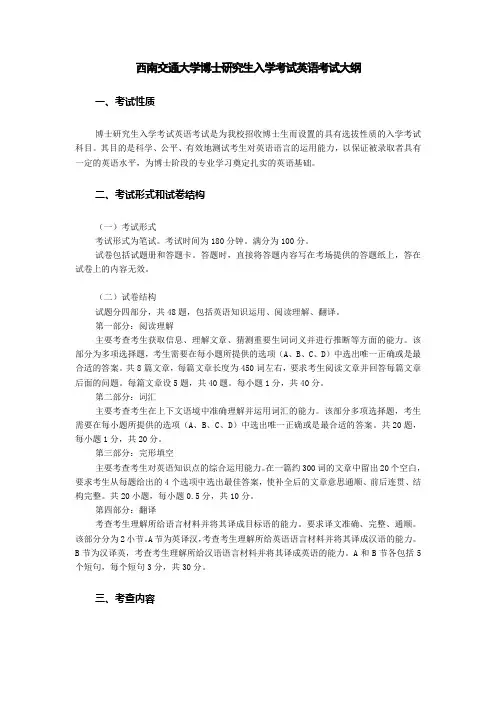
西南交通大学博士研究生入学考试英语考试大纲一、考试性质博士研究生入学考试英语考试是为我校招收博士生而设置的具有选拔性质的入学考试科目。
其目的是科学、公平、有效地测试考生对英语语言的运用能力,以保证被录取者具有一定的英语水平,为博士阶段的专业学习奠定扎实的英语基础。
二、考试形式和试卷结构(一)考试形式考试形式为笔试。
考试时间为180分钟。
满分为100分。
试卷包括试题册和答题卡。
答题时,直接将答题内容写在考场提供的答题纸上,答在试卷上的内容无效。
(二)试卷结构试题分四部分,共48题,包括英语知识运用、阅读理解、翻译。
第一部分:阅读理解主要考查考生获取信息、理解文章、猜测重要生词词义并进行推断等方面的能力。
该部分为多项选择题,考生需要在每小题所提供的选项(A、B、C、D)中选出唯一正确或是最合适的答案。
共8篇文章,每篇文章长度为450词左右,要求考生阅读文章并回答每篇文章后面的问题。
每篇文章设5题,共40题。
每小题1分,共40分。
第二部分:词汇主要考查考生在上下文语境中准确理解并运用词汇的能力。
该部分多项选择题,考生需要在每小题所提供的选项(A、B、C、D)中选出唯一正确或是最合适的答案。
共20题,每小题1分,共20分。
第三部分:完形填空主要考查考生对英语知识点的综合运用能力。
在一篇约300词的文章中留出20个空白,要求考生从每题给出的4个选项中选出最佳答案,使补全后的文章意思通顺、前后连贯、结构完整。
共20小题,每小题0.5分,共10分。
第四部分:翻译考查考生理解所给语言材料并将其译成目标语的能力。
要求译文准确、完整、通顺。
该部分分为2小节。
A节为英译汉,考查考生理解所给英语语言材料并将其译成汉语的能力。
B节为汉译英,考查考生理解所给汉语语言材料并将其译成英语的能力。
A和B节各包括5个短句,每个短句3分,共30分。
三、考查内容考生应掌握下列语言知识和技能:(一)语言知识1. 语法知识考生应能熟练地运用基本的语法知识,其中包括:(1)名词、代词的数和格的构成及其用法;(2)动词时态、语态的构成及其用法;(3)形容词与副词的比较级和最高级的构成及其用法;(4)常用连接词的词义及其用法;(5)非谓语动词(不定式、动名词、分词)的构成及其用法;(6)虚拟语气的构成及其用法;(7)各类从句(定语从句、主语从句、表语从句等)及强调句型的结构及其用法;(8)倒装句、插入语的结构及其用法。
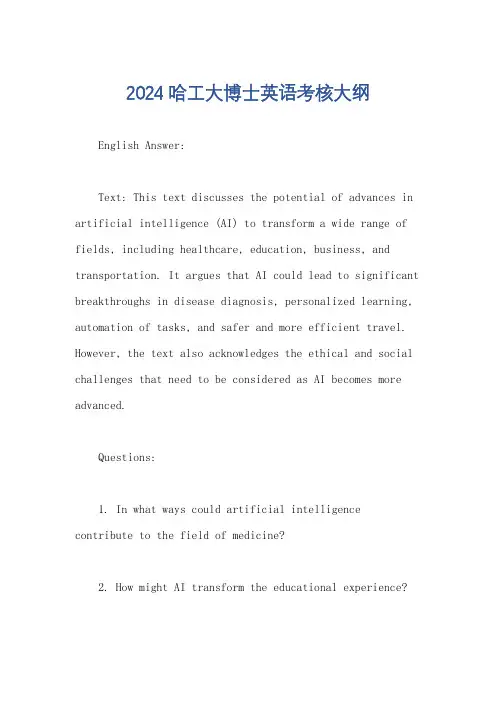
2024哈工大博士英语考核大纲English Answer:Text: This text discusses the potential of advances in artificial intelligence (AI) to transform a wide range of fields, including healthcare, education, business, and transportation. It argues that AI could lead to significant breakthroughs in disease diagnosis, personalized learning, automation of tasks, and safer and more efficient travel. However, the text also acknowledges the ethical and social challenges that need to be considered as AI becomes more advanced.Questions:1. In what ways could artificial intelligencecontribute to the field of medicine?2. How might AI transform the educational experience?3. What are some of the potential benefits of AI for businesses?4. How could AI improve transportation systems?5. What ethical and social issues need to be addressed as AI advances?6. How can we ensure that AI is used for the benefit of society and not to the detriment?Answers:1. Artificial intelligence has the potential to revolutionize healthcare by automating routine tasks, enabling more precise disease diagnosis, facilitating personalized treatment plans, and expediting drug discovery.2. AI can personalize the learning experience, provide real-time feedback to students, and identify areas where additional support is needed. It can also make education more accessible to people who may not have traditionalaccess to schools or universities.3. AI can help businesses streamline operations, increase efficiency, and create new products and services.It can also assist with customer service, marketing, and supply chain management.4. AI can be used to develop safer and more efficient transportation systems. It can be applied to traffic management, vehicle safety, and route optimization. It can also contribute to the development of self-driving cars and other autonomous vehicles.5. Ethical and social issues that need to be addressed as AI advances include data privacy, algorithmic fairness, and the potential for job displacement.6. To ensure that AI is used for the benefit of society, it is essential to establish ethical guidelines, promote transparency, and invest in research on the social and economic impacts of AI.中文回答:文本,本文讨论了人工智能(AI)进步在医疗保健、教育、商业和运输等广泛领域的变革潜力。
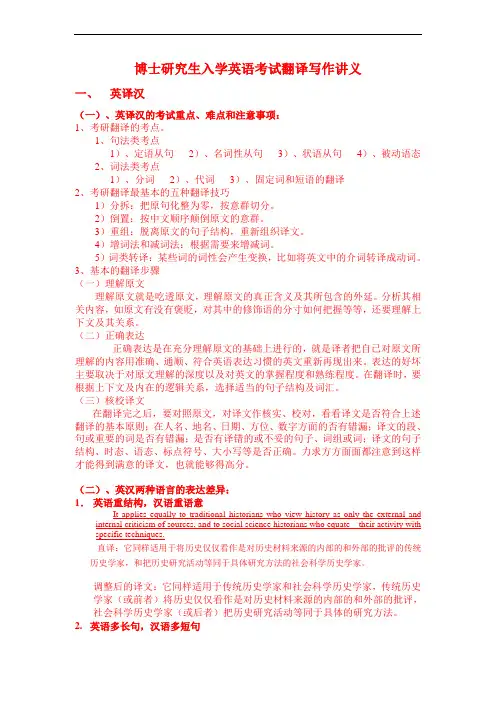
博士研究生入学英语考试翻译写作讲义一、英译汉(一)、英译汉的考试重点、难点和注意事项:1、考研翻译的考点。
1、句法类考点1)、定语从句2)、名词性从句3)、状语从句4)、被动语态2、词法类考点1)、分词2)、代词3)、固定词和短语的翻译2、考研翻译最基本的五种翻译技巧1)分拆:把原句化整为零,按意群切分。
2)倒置:按中文顺序颠倒原文的意群。
3)重组:脱离原文的句子结构,重新组织译文。
4)增词法和减词法:根据需要来增减词。
5)词类转译:某些词的词性会产生变换,比如将英文中的介词转译成动词。
3、基本的翻译步骤(一)理解原文理解原文就是吃透原文,理解原文的真正含义及其所包含的外延。
分析其相关内容,如原文有没有褒贬,对其中的修饰语的分寸如何把握等等,还要理解上下文及其关系。
(二)正确表达正确表达是在充分理解原文的基础上进行的,就是译者把自已对原文所理解的内容用准确、通顺、符合英语表达习惯的英文重新再现出来。
表达的好坏主要取决于对原文理解的深度以及对英文的掌握程度和熟练程度。
在翻译时,要根据上下文及内在的逻辑关系,选择适当的句子结构及词汇。
(三)核校译文在翻译完之后,要对照原文,对译文作核实、校对,看看译文是否符合上述翻译的基本原则;在人名、地名、日期、方位、数字方面的否有错漏;译文的段、句或重要的词是否有错漏;是否有译错的或不妥的句子、词组或词;译文的句子结构、时态、语态、标点符号、大小写等是否正确。
力求方方面面都注意到这样才能得到满意的译文,也就能够得高分。
(二)、英汉两种语言的表达差异:1.英语重结构,汉语重语意It applies equally to traditional historians who view history as only the external and internal criticism of sources, and to social science historians who equate their activity with specific techniques.直译:它同样适用于将历史仅仅看作是对历史材料来源的内部的和外部的批评的传统历史学家,和把历史研究活动等同于具体研究方法的社会科学历史学家。
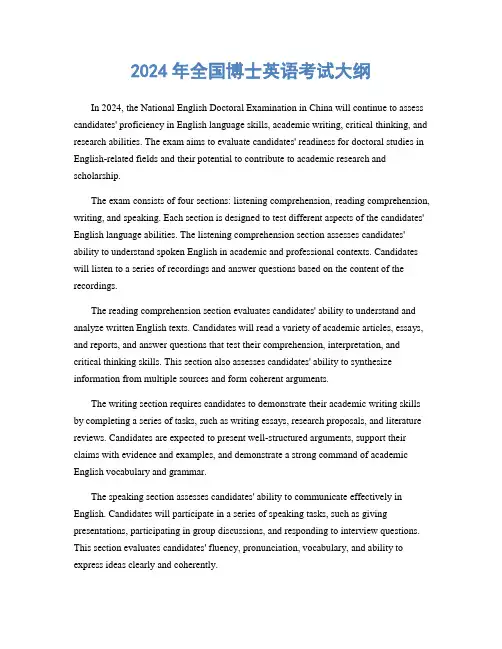
2024年全国博士英语考试大纲In 2024, the National English Doctoral Examination in China will continue to assess candidates' proficiency in English language skills, academic writing, critical thinking, and research abilities. The exam aims to evaluate candidates' readiness for doctoral studies in English-related fields and their potential to contribute to academic research and scholarship.The exam consists of four sections: listening comprehension, reading comprehension, writing, and speaking. Each section is designed to test different aspects of the candidates' English language abilities. The listening comprehension section assesses candidates' ability to understand spoken English in academic and professional contexts. Candidates will listen to a series of recordings and answer questions based on the content of the recordings.The reading comprehension section evaluates candidates' ability to understand and analyze written English texts. Candidates will read a variety of academic articles, essays, and reports, and answer questions that test their comprehension, interpretation, and critical thinking skills. This section also assesses candidates' ability to synthesize information from multiple sources and form coherent arguments.The writing section requires candidates to demonstrate their academic writing skills by completing a series of tasks, such as writing essays, research proposals, and literature reviews. Candidates are expected to present well-structured arguments, support their claims with evidence and examples, and demonstrate a strong command of academic English vocabulary and grammar.The speaking section assesses candidates' ability to communicate effectively in English. Candidates will participate in a series of speaking tasks, such as giving presentations, participating in group discussions, and responding to interview questions. This section evaluates candidates' fluency, pronunciation, vocabulary, and ability to express ideas clearly and coherently.Overall, the National English Doctoral Examination in 2024 aims to evaluate candidates' English language proficiency, critical thinking skills, and readiness for doctoral studies in English-related fields. Candidates are encouraged to prepare thoroughly for the exam by practicing listening, reading, writing, and speaking skills, familiarizing themselves with academic English texts, and honing their analytical and research abilities. Success in the exam will not only demonstrate candidates' academic potential but also pave the way for their future academic and professional success in English-related fields.。
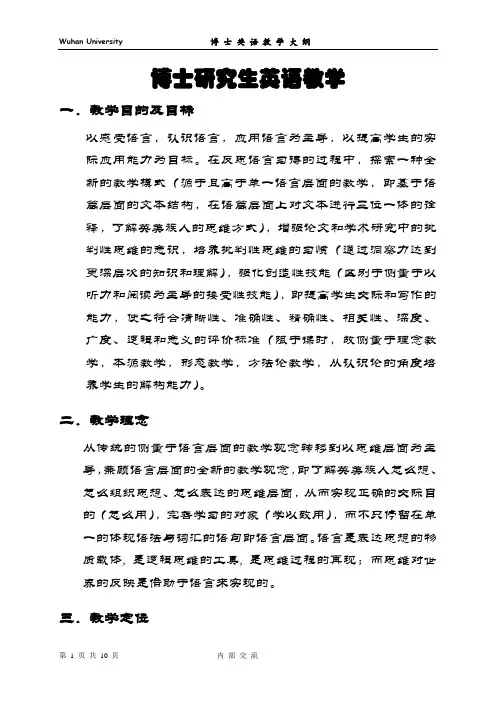
博士研究生英语教学一.教学目的及目标以感受语言,认识语言,应用语言为主导,以提高学生的实际应用能力为目标。
在反思语言习得的过程中,探索一种全新的教学模式(源于且高于单一语言层面的教学,即基于语篇层面的文本结构,在语篇层面上对文本进行三位一体的诠释,了解英美族人的思维方式),增强论文和学术研究中的批判性思维的意识,培养批判性思维的习惯(通过洞察力达到更深层次的知识和理解),强化创造性技能(区别于侧重于以听力和阅读为主导的接受性技能),即提高学生交际和写作的能力,使之符合清晰性、准确性、精确性、相关性、深度、广度、逻辑和意义的评价标准(限于课时,故侧重于理念教学,本源教学,形态教学,方法论教学,从认识论的角度培养学生的解构能力)。
二.教学理念从传统的侧重于语言层面的教学观念转移到以思维层面为主导,兼顾语言层面的全新的教学观念,即了解英美族人怎么想、怎么组织思想、怎么表达的思维层面,从而实现正确的交际目的(怎么用),完善学习的对象(学以致用),而不只停留在单一的体现语法与词汇的语句即语言层面。
语言是表达思想的物质载体, 是逻辑思维的工具, 是思维过程的再现;而思维对世界的反映是借助于语言来实现的。
三.教学定位以思维模式为切入点(显著区别于本科生,即通过纯粹的联想或死记硬背以及练习来完成的低阶段的学习;硕士生,即大量的知识积累却缺乏知识自身的相关逻辑;以及其他兄弟院校的英语教学,具有武汉大学特色的博士研究生英语教学),提高学生的综合分析能力,倡导英语学习的方法论,以期突破英语学习的瓶颈问题。
知其然更力求知其所以然,强化实践过程中的批判性思维能力(分析性、逻辑性、系统化)。
四.教学手段/方法以三位一体(角度的界定,文献的摘录,功能的区分)的训练方法完成对文本的解构,运用批判性思维的分析能力,以期了解英美族人的思维方式即what to write,组织布局即how to write和结构功能即why to write。
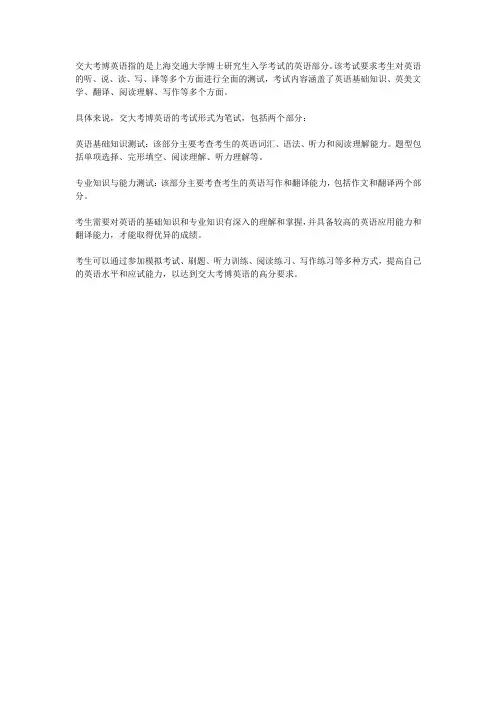
交大考博英语指的是上海交通大学博士研究生入学考试的英语部分。
该考试要求考生对英语的听、说、读、写、译等多个方面进行全面的测试,考试内容涵盖了英语基础知识、英美文学、翻译、阅读理解、写作等多个方面。
具体来说,交大考博英语的考试形式为笔试,包括两个部分:
英语基础知识测试:该部分主要考查考生的英语词汇、语法、听力和阅读理解能力。
题型包括单项选择、完形填空、阅读理解、听力理解等。
专业知识与能力测试:该部分主要考查考生的英语写作和翻译能力,包括作文和翻译两个部分。
考生需要对英语的基础知识和专业知识有深入的理解和掌握,并具备较高的英语应用能力和翻译能力,才能取得优异的成绩。
考生可以通过参加模拟考试、刷题、听力训练、阅读练习、写作练习等多种方式,提高自己的英语水平和应试能力,以达到交大考博英语的高分要求。
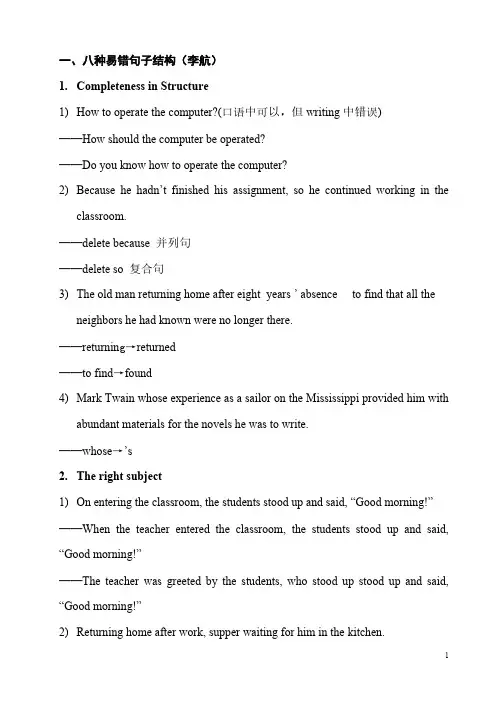
一、八种易错句子结构(李航)pleteness in Structure1)How to operate the computer?(口语中可以,但writing中错误)——How should the computer be operated?——Do you know how to operate the computer?2)Because he hadn’t finished his assignment, so he continued working in theclassroom.——delete because 并列句——delete so 复合句3)The old man returning home after eight years ’ absence to find that all theneighbors he had known were no longer there.——returnin g→returned——to find→found4)Mark Twain whose experience as a sailor on the Mississippi provided him withabundant materials for the novels he was to write.——whose→’s2.The right subject1)On entering the classroom, the students stood up and said, “Good morning!”——When the teacher entered the classroom, the students stood up and said, “Good morning!”——The teacher was greeted by the students, who stood up stood up and said, “Good morning!”2)Returning home after work, supper waiting for him in the kitchen.——Returning home after work, he saw/found supper waiting for him.3)After finishing her composition, the translation exercise was taken up.——After finishing her composition, she took up the translation exercise.4)Hurrying to the conference room, no one was there.——Hurrying to the conference room, he/she found no one was there.5)To look at the map, the important of the new railway was seen.——To look at the map, you may see the important of the new railway.3.Agreement between the subject and the predicate verb1)His whole family is/are here with him.(are)2)The majority of the students taking this exam are girls.(majority of +名词复数,谓语aremajority of +不可数名词,谓语is)3)The cattle belong to to that ranch. (cattle, police, people等集合名词,谓语复数)4)There is an enormous audience in the hall.5)The audience were shocked by the scenes of violence in the film.6)There is an old man and three young men.7)Either you or I am to take up the work.(后一个主语,决定谓语单复数)8)Where I can put all there is a problem.(主语从句,谓语单数)例外,What引导主从,其谓语由宾语单复数决定。
2022年考研考博-考博英语-西南交通大学考试全真模拟易错、难点剖析AB卷(带答案)一.综合题(共15题)1.单选题Women have significant advantages over men in space because they need less food and less oxygen and they()radiation better.问题1选项A.stand in withB.stand in forC.stand up forD.stand up to【答案】D【解析】句意:在太空中,女性比男性有着显著的优势,因为她们需要的食物和氧气更少,而且她们更能抵抗辐射。
考查短语辨析。
stand in with 与……联合,合谋;stand in for 代替; stand up for 支持,坚持,stand up to 经得起,抵抗。
空格处的宾语是“辐射”,因此D项正确。
2.单选题It was obvious that she and her husband were()and she wished she'd never married him.问题1选项A.insolvableB.insensibleC.inseparableD.incompatible【答案】D【解析】句意:很明显她和她丈夫是水火不相容的,她希望自己从来没有嫁给他。
考查形容词辨析。
insolvable不能解决(答)的;insensible 昏迷的,无知觉的;inseparable 不可分离的;incompatible 不相容的,矛盾的。
根据后半句“她希望自己从来没有嫁给他”可知D符合句意。
3.单选题They () so tired if they ()for a whole day.问题1选项A.wouldn’t feel, didn’t walkB.wouldn't feel, weren’t walking.C.wouldn't be feeling, weren’t walkingD.wouldn't be feeling, hadn’t been walking【答案】D【解析】考查虚拟语气。
2024年医学考博英语统考大纲2024 Medical Doctoral Program English Exam OutlineIntroduction:The Medical Doctoral Program aims to cultivate high-quality medical professionals with solid theoretical knowledge and practical skills. The English exam is an essential part of the admissions process, testing candidates' language proficiency and ability to comprehend medical-related content. The following outline details the topics and format of the 2024 Medical Doctoral Program English exam.I. Reading Comprehension (50%)1. General Medical KnowledgeCandidates will be required to read a series of passages related to various medical fields, such as anatomy, physiology, pathology, pharmacology, and biochemistry. Questions will test candidates' understanding of key concepts, terminology, and scientific principles.2. Clinical CasesCandidates will be presented with clinical cases, including patient histories, symptoms, and diagnostic results. Questionswill assess candidates' ability to analyze and interpret medical information, identify potential diagnoses, and propose appropriate treatment plans.3. Medical ResearchCandidates will read research articles and studies on current medical topics and advancements. Questions will evaluate candidates' comprehension of research methods, data analysis, and interpretation of results.II. Listening Comprehension (20%)1. Medical LecturesCandidates will listen to recorded medical lectures on various topics, such as internal medicine, surgery, pediatrics, and obstetrics. Questions will test candidates' ability to grasp key points, identify important information, and summarize complex medical concepts.2. Doctor-Patient DialoguesCandidates will listen to simulated doctor-patient dialogues, focusing on patient interviews, symptom descriptions, and treatment discussions. Questions will assess candidates' listening skills, as well as their ability to empathize with patients and communicate effectively in medical settings.III. Writing (30%)1. Medical EssayCandidates will be required to write an essay on a given medical topic, expressing their opinions and analysis in a clear and concise manner. Topics may cover issues such as medical ethics, healthcare policies, patient care, and medical education.2. Case AnalysisCandidates will analyze a clinical case study, including patient information, symptoms, and treatment options. Candidates must provide a detailed analysis of the case, offer a differential diagnosis, and propose a course of action based on evidence-based medicine.3. Research ProposalCandidates will develop a research proposal on a specific medical topic, outlining the study objectives, methodology, data collection, analysis plan, and potential implications for clinical practice. Candidates must demonstrate their ability to design and conduct research in a rigorous and ethical manner.Conclusion:The 2024 Medical Doctoral Program English exam aims to assess candidates' language proficiency, critical thinking skills, and readiness for advanced medical studies. By testing candidates' understanding of medical concepts, communication skills, and analytical abilities, the exam ensures that only highly qualified candidates are admitted to the program. Candidates who excel in the exam will have the opportunity to pursue their passion for medicine and contribute to the advancement of healthcare worldwide.。
福州大学博士研究生入学考试英语考试大纲一、考查目标本考试重点考查考生的英语语言知识和语言技能(本考试属水平考试,不指定任何参考书)。
具体要求如下:1. 词汇要求考生掌握约5000个英语词汇和约500个常用词组。
此外,还应掌握词汇间的词义关系,如同义词、近义词、反义词等;掌握词汇之间的搭配关系,如动词与介词、形容词与介词、形容词与名词等;掌握词汇生成的基本知识,如词源、词根、词缀等。
2.语法要求考生熟练掌握英语的基本语法知识、常用句型和结构,能正确理解包含这些知识、句型和结构的句子和语篇,并能在实践中准确、自如地运用这些知识。
3.阅读要求考生能综合运用英语语言知识和阅读技能熟练地阅读和理解一般性题材的文章、科技文章及应用性形式的阅读材料。
要求能理解主旨大意,读懂细节,能理解上下文的逻辑关系,并领会作者或话语参与各方的主要意图和态度及其异同等。
4.语篇完形处理在理解阅读材料的基础上能综合运用词汇、语法、搭配、语段、篇章逻辑等方面的知识和上下文等对语篇各层次的信息进行正确判断和完形处理。
5.翻译(1)英译汉要求考生能在30分钟内把一篇150词左右的一般性题材的英语短文或科学常识性文章中的段落译成汉语,能准确表达原文的意思,语句通顺,用词正确,无较大的语言错误。
(2)汉译英要求考生能在30分钟内把一篇150字左右的一般性题材的汉语短文或科学常识性文章中的段落译成英语。
要求译文忠实于原文,译文达意,符合英语表达习惯,无较大的语言错误。
6.写作要求考生能根据命题或图表等在30分钟内写出一篇200字以上的短文,或根据所给文章(中文或英文)要求写出200字以上的英文摘要。
写作部分的考查目标是测试考生用英语书面表达思想和见解的能力。
所写文章应切合主题,能正确表达思想,意义连贯,无较大的语言错误。
二、题型、题量、分值本考试所制定的试卷为笔试,卷面分为试卷一和试卷二,共有五个部分,包括词汇与语法、阅读理解、完形填空、翻译和写作。
全国医学博士外语统一考试大纲全国医学博士外语统一考试(Medical Doctoral English Test,简称MDET)是一个面向医学博士研究生的外语考试,旨在考查学生在医学领域中的英语水平,包括听、说、读、写四部分。
本文将介绍MDET的大纲,并为考生提供参考内容。
一、考试形式MDET分为英语听力、英语口语、英语阅读和英语写作4个部分,总计120分。
具体形式如下:1.英语听力(30分):共有三个部分,第一部分是听取3个独立的短篇对话,每篇对话后有一个问题;第二部分是听取2个长篇对话或独白,并回答几个问题;第三部分是听取1篇较长的讲座并回答问题。
2.英语口语(30分):由两个部分组成。
第一部分是就一个给定的话题进行发言;第二部分是就一个给定的问题进行讨论。
3.英语阅读(30分):共有三个部分,第一部分是五个题目的单项选择题;第二部分是四个题目的多项选择题;第三部分是一篇文章,需回答一些问题。
4.英语写作(30分):需完成一篇约350个单词的论文作文。
二、考试内容MDET的考试内容主要涉及基础医学、临床医学和医学相关领域的知识。
以下是考试常见的考点和题型:1.医学专业词汇:如anatomy解剖学、physiology生理学、pharmacology药理学、pathology病理学等。
2.医学研究方法:如实验设计、统计分析方法、文献查阅等。
3.医学科研进展:如新医疗技术、新型疾病、新药研发等。
4.临床实践:如病例分析、病史记录、医嘱书写等。
考生需要掌握医学领域的核心知识和术语,并能够运用英语进行专业交流和写作。
三、考试参考内容考生可根据考试大纲的内容,准备以下参考内容:1.医学类英语词汇疾病:diabetes糖尿病、cancer癌症、hypertension高血压、influenza流感、pneumonia肺炎、arthritis关节炎药物:antibiotics抗生素、antidepressants抗抑郁药、painkillers 止痛药、sedatives镇静剂、hypnotics催眠药医学专业词汇:anatomy解剖学、physiology生理学、pharmacology药理学、cardiology心血管病学、neurology神经病学2.医学文献阅读熟悉医学论文的阅读方法及常用的医学期刊,如New England Journal of Medicine、JAMA(Journal of American Medical Association)、Lancet等。
全国医学博士外语统一考试英语考试大纲全国医学博士外语统一考试英语考试大纲一、考试目的为配合我国实施医学专业学位制度,保证医学博士生学位授予质量,举行全国医学博士外语统一考试。
考试目的在于科学公正地测试考生掌握和运用英语的实际能力是否达到申请临床医学博士专业学位或攻读医学博士学位的英语水平。
二、考试设计1.本考试主要是用于博士生入学和申请医学博士专业学位的一种英语水平考试,其命题不以某一种医学英语教材为主要命题依据。
2.考试内容为医学公共英语,注重突出临床医学特点。
3.本考试从听力、词语用法、综合理解、阅读、书面表达五个方面命题,全面测试考生的英语能力,并突出对考生的英语应用和交际能力测试,以确定其是否已达到在职申请医学博士专业学位的英语水平或是否已达到医学博士研究生入学英语水平。
试卷一(Paper One)Ⅰ.听力理解(Listening Comprehension)30分钟Section A:简短对话(Short Conversations)简短对话旨在测试考生的英语听力能力,要求考生在听完每个对话之后,根据所听内容于12秒钟内对每个问题后的四个选择项做出正确选择,每个对话及提问只读一遍。
本部分共15小题,编号为1-15,每题1分,共计15分。
Section B:长对话及短文(Longer Conversations and Talks)本部分由一篇长对话和二篇短文组成,旨在测试考生对英语篇章的听力理解能力。
要求考生能理解所听材料的中心思想和主要内容,并能根据所听到的内容进行逻辑推理、分析概括和归纳总结。
每篇材料后附有5个问题,每个问题后均有四个选择项。
要求考生在听完每个问题后,于12秒钟内从中选出一个最佳答案。
每篇材料及提问只读一遍。
该部分共15小题,编号为16-30,每题1分,共计15分。
Ⅱ.词语用法(Vocabulary)10分钟词语用法旨在测试考生对英语词汇和短语的理解和使用能力,分两部分:Section A和Section B。
西南交通大学博士研究生入学考试英语考试大纲
一、考试性质
博士研究生入学考试英语考试是为我校招收博士生而设置的具有选拔性质的入学考试科目。
其目的是科学、公平、有效地测试考生对英语语言的运用能力,以保证被录取者具有一定的英语水平,为博士阶段的专业学习奠定扎实的英语基础。
二、考试形式和试卷结构
(一)考试形式
考试形式为笔试。
考试时间为180分钟。
满分为100分。
试卷包括试题册和答题卡。
答题时,直接将答题内容写在考场提供的答题纸上,答在试卷上的内容无效。
(二)试卷结构
试题分四部分,共48题,包括英语知识运用、阅读理解、翻译。
第一部分:阅读理解
主要考查考生获取信息、理解文章、猜测重要生词词义并进行推断等方面的能力。
该部分为多项选择题,考生需要在每小题所提供的选项(A、B、C、D)中选出唯一正确或是最合适的答案。
共8篇文章,每篇文章长度为450词左右,要求考生阅读文章并回答每篇文章后面的问题。
每篇文章设5题,共40题。
每小题1分,共40分。
第二部分:词汇
主要考查考生在上下文语境中准确理解并运用词汇的能力。
该部分多项选择题,考生需要在每小题所提供的选项(A、B、C、D)中选出唯一正确或是最合适的答案。
共20题,每小题1分,共20分。
第三部分:完形填空
主要考查考生对英语知识点的综合运用能力。
在一篇约300词的文章中留出20个空白,要求考生从每题给出的4个选项中选出最佳答案,使补全后的文章意思通顺、前后连贯、结构完整。
共20小题,每小题0.5分,共10分。
第四部分:翻译
考查考生理解所给语言材料并将其译成目标语的能力。
要求译文准确、完整、通顺。
该部分分为2小节。
A节为英译汉,考查考生理解所给英语语言材料并将其译成汉语的能力。
B节为汉译英,考查考生理解所给汉语语言材料并将其译成英语的能力。
A和B节各包括5个短句,每个短句3分,共30分。
三、考查内容
考生应掌握下列语言知识和技能:
(一)语言知识
1. 语法知识
考生应能熟练地运用基本的语法知识,其中包括:
(1)名词、代词的数和格的构成及其用法;
(2)动词时态、语态的构成及其用法;
(3)形容词与副词的比较级和最高级的构成及其用法;
(4)常用连接词的词义及其用法;
(5)非谓语动词(不定式、动名词、分词)的构成及其用法;
(6)虚拟语气的构成及其用法;
(7)各类从句(定语从句、主语从句、表语从句等)及强调句型的结构及其用法;
(8)倒装句、插入语的结构及其用法。
2. 词汇
考生应能较熟练地掌握7500个左右常用英语词汇以及相关常用词组。
考生应能根据具体语境、句子结构或上下文理解一些非常用词的词义。
(二)语言技能
1. 阅读
考生应能读懂不同题材和体裁的文字材料。
题材包括经济、管理、社会、文化、科普等,体裁包括说明文、议论文和记叙文等。
根据阅读材料,考生应能:
(1)理解主旨要义;
(2)理解文中的具体信息;
(3)理解语篇的结构和上下文的逻辑关系;
(4)根据上下文推断重要生词或词组的含义;
(5)进行一定的判断和推理;
(6)理解作者的意图、观点或态度。
2. 翻译
考生应能在充分理解的基础上,运用准确、通顺的语言完整翻译各种体裁的语言材料。
根据英译汉的语言材料,考生应能:
(1)根据上下文推测词的词义,从一词多义中确定恰当的词义;
(2)理解英语特殊的表意方式和语序,并准确地转换成符合汉语习惯的句子;
(3)根据上下文进行有关的判断、推理和引申并用汉语进行正确表达。
根据汉译英的语言材料,考生应能:
(1)选用地道的英语词汇和短语,尽量避免中式英语;
(2)理解汉语特殊的表意方式和语序,并准确地转换成符合英语习惯的句子。